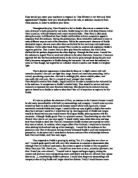Many dramatic tragedies occur because of human limitations, the sheer fact that the human body and spirit is not infallible, rather it is most vulnerable. Hedda’s limitation is not at all physical, but it is the fact that she is socially insecure. Having married into a lower class, she now feels stifled and bored by the people she communes with, because she has this romantic vision of a world of nobility and beauty. She feels trapped because she is caught internally between the struggle wanting something and not being able to get it. This is a strong argument for the play to be described as a tragedy; the protagonist suffers terribly, because the playwright has identified a human weakness and expanded upon it. Of course, Hedda’s imperfectness leads to her suicide:
“In that she dies, she proves herself to be among those free born, untamed creatures; for in the necessity of her death, there first is revealed the whole tragedy of the uncanny contradiction of Hedda Gabler: the tragic aspect is that Hedda may only prove to herself the true existence of her inner freedom by cancelling herself out.”
Lou Salome
In the classic tragedies (such as those of Shakespeare), the protagonist was usually someone of high stature (a King, for example), so that the fall in grace of the character is emphasised to create further tragedy. Hedda too can be interpreted as a figure of very high social standing, but in my opinion the text suggests otherwise: as far as her position in the community is concerned, she is merely just another woman.
Early tragedies (as opposed to more contemporary ones) held a very moralistic learning element within them. This is true of virtually any Greek tragedy, as the audience are somewhat preached to, told that ‘if you do this, then this will happen to you’. Ultimately, the tragic ending of such a play leads to a learning process that the suffering has brought about for the character. The result of the play, as Aristotle saw it, should bring about discovery and recognition for the character and the audience. But what does Hedda actually achieve by committing suicide? Does she ‘learn’ or ‘discover’ anything because of it?
Ibsen with diabolical irony arranged a situation which bears close superficial resemblance to the traditional tragic end. Hedda gains no insight; her death affirms nothing of importance. She never understands why, at her touch, everything becomes "ludicrous and mean." She dies to escape a sordid situation that is largely of her own making and she will not face reality nor assume responsibility for the consequences of her acts. The pistols, having descended to a coward and a cheat, bring only death without honour.
Caroline W. Mayerson:
This suggests that Hedda’s descent has not been punctuated with any deep moral, and at the end the audience are left contemplating the inevitability of this woman’s demise. The above quote backs up my own ideas about how the play should be interpreted. The play is not tragic in this sense, but is a complex psychological and social study of a woman. Indeed, Ibsen himself said that he wanted his play to solely depict human beings, emotions, and destinies, upon the groundwork of social conditions in his time.
Ibsen once wrote, “It was not really my intention to deal in this play with so-called problems.” Yet there has been much academic discussion as to whether Hedda Gabler is a ‘Problem Play’. The question we should be asking, therefore, is ‘what is wrong with the society in which Hedda lives?’ The answer is not so simple. Hedda moves from her higher social class into this lower one, where the people she meets she finds annoying because of their selfless good will and well-meaning. She perceives the problem with this society to be that they are not like her. They do not conform to her idea of a beautiful, aesthetic existence. In order for this play to be a ‘Problem Play’, the audience must side with Hedda, and her ideas. Thus, when Hedda realises that she is powerless to change anyone, the audience sympathises with her, and hence her death is tragic. On the other hand, if the play is presented with Hedda being uncompromising and unrealistic, childlike in her beliefs, then the audience may fail to sympathise with Hedda and the play returns to it’s playwrights vision (solely depicting human beings, emotions, and destinies).
The play on stage will make use of some of these ideas, as some directors choose to emphasise certain aspects of this piece. In the text, the play is two-dimensional, lifeless, and it is only on stage where we see subtext that may not have been obvious to us before. Thus, ultimately, the play’s status as a tragedy can only be defined through dramatic interpretation.
I’ve always said that the tragedy of Hedda Gabler is that she’s the only woman in Scandinavia with a sense of humour.
Hugh Stapleton (director of a recent Broadway production of Hedda)







